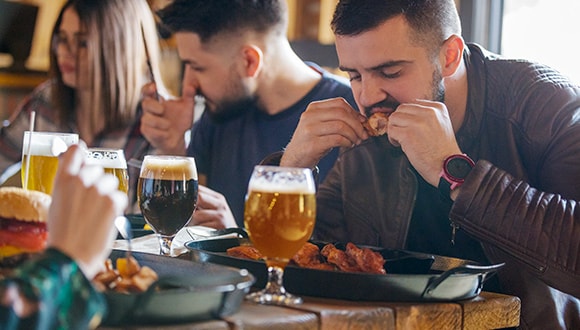How do alcoholic drinks impact your weight?
Published June 2025 | 5 min read
Expert contributor: Gabby Zammit, HCF Health Coach and accredited practising dietitian
Words by Jo Hartley
Consuming alcoholic drinks regularly could mean you’re finding it harder to maintain a healthy weight. Find out why and discover some simple solutions.
About 77% of Australians drink alcohol in one form or another, making it the most widely used drug in the country. It’s linked to health issues like some cancers, strokes and mental health problems. It may also be putting a strain on our waistlines.
“Weight gain from alcohol consumption is common, especially in individuals who drink regularly or in large quantities, because it’s easy to take in more energy [kilojoules] than you burn in a day,” says Gabby Zammit, HCF Health Coach and accredited practising dietitian.
“Alcohol is a high-kilojoule drink containing 29 kilojoules per gram. This is almost as much as fat [37kJ per gram] and significantly more than protein or carbohydrates [17kJ per gram]. That’s without all the kilojoules in the added sugars and carbohydrates.”
Want to know how your favourite alcoholic drinks compare to other high-kilojoule foods? Here are a few examples:
- Glass of red wine (150ml – 1.5 standard drinks) – 478kJ
- Standard ‘lager’ beer (375ml – 1.7 standard drinks) – 659kJ
- Cadbury Dairy Milk Freddo (12g) – 269kJ
- Small fries from McDonald's – 916kJ
How ‘empty’ are the kilojoules in alcoholic drinks?
“When we talk about alcohol having ‘empty kilojoules’, it means that it contains energy [kilojoules] without any beneficial nutrients,” says Gabby.
“When alcohol is being metabolised in our body, it also depletes our stores of important nutrients like vitamin B12 and takes priority over burning kilojoules from fat.”
According to the Australian National Health and Medical Research Council alcohol guidelines, healthy adults should drink:
- no more than 10 standard drinks a week
- no more than four standard drinks in any one day.
It’s important to measure standard drinks based on the amount of alcohol they have, rather than the number of drinks you consume. A standard drink contains 10g of pure alcohol, no matter what type of tipple you prefer. Check the label on alcohol to find out how many standard drinks it contains.
Drinking above the recommended limit puts you at increased risk of developing long-term conditions like cardiovascular disease, cancer, type 2 diabetes, liver disease, mental illness and cognitive impairment.
Drinking more than the guidelines recommend – both in terms of how much you drink and how often – can also morph into alcohol dependence, also known as alcoholism or alcohol abuse.
“Alcoholism is an inability to control drinking, despite it negatively impacting your social, physical and emotional health,” says Gabby. “Signs of alcoholism or ‘alcohol use disorder’ include a very high tolerance to alcohol, withdrawal symptoms like anxiety or tremors when not drinking alcohol, and strong cravings for alcohol.”
If you or someone you know is affected by alcoholism, talk to your GP or contact the National Alcohol and Other Drug hotline on 1800 250 015.

How does alcohol affect your appetite?
Reaching for extra food after drinking alcohol? Craving those salty and greasy options? You’re not imagining it. Studies have shown alcohol consumption can lead people to make unhealthy food choices and eat more than they usually would.
“Alcohol decreases inhibitions and leads to impaired decision-making. So, when drinking alcohol, people tend to choose foods based on taste and convenience rather than consciously choosing healthy options,” says Gabby.
“After drinking alcohol, people often feel fatigued, and this also contributes to eating convenient, energy-dense foods instead of preparing or seeking out a healthy meal.”
What are the indirect impacts of alcohol on your weight?
“Alcohol can negatively affect both sleep quality and mood, which in turn can impact eating habits and weight,” says Gabby.
“Evidence shows if you have alcohol in your system while you sleep, it can decrease your quality of sleep and disrupt your normal sleep cycles. The more alcohol you consume, the more your sleep quality decreases.”
If you’re tired due to poor sleep, you’re more likely to crave foods that provide a quick hit of energy. You tend to choose foods that are higher in sugar and kilojoules instead of nutrient-dense, satisfying options.
When you’re tired, you’re also less likely to be physically active, which can further contribute to weight gain.
But it’s not just poor sleep that can impact your waistline. Your mood can, too.
Alcohol is classified as a depressant drug, which slows down the function of your brain and disrupts the chemicals and processes that affect how you feel.
At first, alcohol may provide pleasure by stimulating the release of dopamine, the brain’s ‘feel-good’ chemical. But over time and the more you drink, this effect lessens, and you may begin to experience increased feelings of anxiety, worry and low mood.
“Low mood can drive us to seek comfort foods that trigger dopamine release, activating the brain’s reward system,” says Gabby. “This can lead to overeating, even when we’re not physically hungry, increasing overall kilojoule intake and the risk of weight gain.”
On the flipside, drinking excessive amounts of alcohol can lead to weight loss, which may be a sign of liver damage. Regular heavy drinking forces the liver to work overtime, potentially leading to serious and irreversible damage like cirrhosis. Loss of appetite is a common symptom of cirrhosis.
Alcohol abuse may also contribute to fatty liver disease. The good news is you can prevent or reverse some of the damage with lifestyle changes like avoiding or quitting alcohol, improving your diet and staying physically active.

Better alcohol choices for weight management
When drinking alcohol, there are simple ways to make choices that support your health and weight goals. Here are some of Gabby’s top tips.
- Swap out your normal drinks for lower kilojoule alcohol options like ultra-light beer, or spirits mixed with soda water or sugar-free soft drinks.
- Measure your glass of wine and use a smaller glass. A freely poured 300ml glass of wine will have double the kilojoules (and alcohol) of a 150ml glass of wine.
- Choose a healthy meal and stay hydrated when drinking alcohol. This can reduce the ‘hangover’ and fatigue after drinking, as well as the negative impact on your sleep and eating habits the following day.
“It ultimately comes down to energy in versus energy out,” says Gabby. “Even the smallest changes can make a difference. “By swapping your evening glass of wine for a soda water, you’ll sleep better and wake up ready to start your day with some exercise.”
Changing behaviours and supporting your mental health
Changing your habits and behaviours – whether with alcohol, food or something else – isn’t always easy. The free Daybreak app is an online behaviour change program that helps you reassess your relationship with alcohol, providing 24/7 digital support and connecting you with a like-minded online community. Through our partnership with Daybreak, eligible HCF members can also be referred to additional mental health support*.
If you’re in need of a little extra support, our mental health programs include a free HealthyMinds Check-in^ for eligible members. This gives you faster, easier access to psychologists and digital support services to help you take control of your mental wellbeing.
Related articles
How to change your drinking habits
If you’ve made the choice to change the way you drink, or to give up alcohol, these go-to responses will help you feel confident in your decision.
Why alcohol and sleep don’t mix
Alcohol can impact the quality of your sleep and lead to other health risks. Here’s how to break the cycle.
Are you drinking too much?
Alcohol often feels like a normal part of life, so how do you know when you're drinking too much?
Dangers of the alcohol reward system
For many of us, drinking is seen as a well-earned reward after a tough day. But how can you replace that daily reward with a healthier gratification?
IMPORTANT INFORMATION
* Depends on level of extras cover. Waiting periods and annual limits apply. For more information see hcf.com.au/daybreak
^ Eligibility criteria apply. For more information see hcf.com.au/mental-support
This communication contains information which is copyright to The Hospitals Contribution Fund of Australia Limited (HCF). It should not be copied, disclosed or distributed without the authority of HCF. Except as required by law, HCF does not represent, warrant and/or guarantee that this communication is free from errors, virus, interception or interference. All reasonable efforts have been taken to ensure the accuracy of material contained on this website. It’s not intended that this website be comprehensive or render advice. HCF members should rely on authoritative advice they seek from qualified practitioners in the health and medical fields as the information provided on this website is general information only and may not be suitable to individual circumstances or health needs. Please check with your health professional before making any dietary, medical or other health decisions as a result of reading this website.